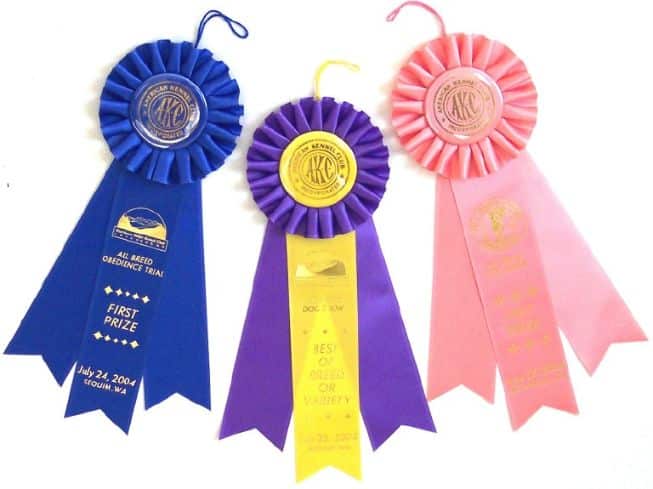How Can Owner Handlers Measure Progress ? Now that 2022 is here, exhibitors are returning to the show ring at events from Palm Springs, California, to Pendleton, South Carolina. With great anticipation—and maybe an uneasy apprehension of the year ahead—ambitious owner handlers are once again setting their sights on achieving goals for themselves and for their dogs in the new year. These goals vary from exhibitor to exhibitor, of course, but the possibility of realizing a personal dream is something that is shared by all. Success can be a strong motivator, and winning often provides the clearest validation that progress is being made. Each win validates the effort and incentivizes the commitment to carry on. Victories in the sport of dogs are cumulative, and no matter one’s personal goals, progress can be measured in any number of ways that are individual, incremental, and affirmative.
Each & Every Ribbon
There is no better symbol of an owner handler’s progress in the sport than the collection of brightly colored ribbons that is amassed during a dog’s career. Those satin (nylon?) strips of fabric commemorate not only the events that are emblazoned in gold and silver on their surfaces, they also represent a progression that frequently begins without focus or direction. Yet, as goals are met and wins recorded, the meaning of each ribbon grows in significance. Some will represent milestones met, while others will signify titles earned. Some ribbons will even indicate lessons learned through unexpected losses. With time and experience, an owner handler’s bounty of ribbons can even come to represent the kind of journey that can transform a novice handler into a serious competitor. Most of all, those vibrant strips of satin can symbolize the individual’s love for a dog and the desire to work together as a team toward achieving more progressively difficult goals.
Rankings Rule!
Successful owner handlers ultimately find their dogs’ names listed in the National Owner-Handled Series rankings. For some, the discovery is a genuine surprise. However, for the exhibitor with ambitious aspirations, the realization that your dog is officially “in the game” can kick-start the kind of competitive spirit that can bring about a sense of focus and the need to strategize. Finding that your efforts to date have already yielded results can be the best motivator for progressing up the rankings. Of course, your competitors have likely been spurred on by the same ranking system, so there’s no time like the present to double down, attend another handling class, enroll in a seminar or seek the guidance of a mentor who has been in your position and can guide you and your dog to “the next level.” Seeking the help of an experienced handler or coach is a proven way to incrementally improve both your skillset and your odds of winning. (Don’t let the competition beat you to it!)
Can’t I Rant?
A rise in the rankings can bring out the best in a competitor, but it can also bring out “the beast.” For some inexperienced owner handlers, show ring success can boost an already fragile ego that soon finds it difficult to lose—or even place. When the expectation has become winning at all costs, the inevitable disappointments can trigger behaviors that are unsportsmanlike at best, and unseemly at worst. Taking to social media to bash the competition, criticize the judge, or accuse the entire system of being “political” does no one any favors, least of all the dog whose owner handler is having a bad day. Complaining about a loss has never helped a single competitor in the history of competitive sports. In competition, sometimes you win, sometimes you lose, and sometimes… you learn. Master competitors learn from defeat as well as from victory, and they use each loss as an opportunity to course-correct and make adjustments. Winners never gloat and they never rant. Instead, winners develop good habits that affirm and inspire.
Although the year ahead will undoubtedly be filled with surprises, owner handlers can always measure progress in ways that are positive and productive. By learning to understand losses, and by putting wins in their proper context, today’s exhibitors stand a good chance of becoming better than they ever knew they could be.









